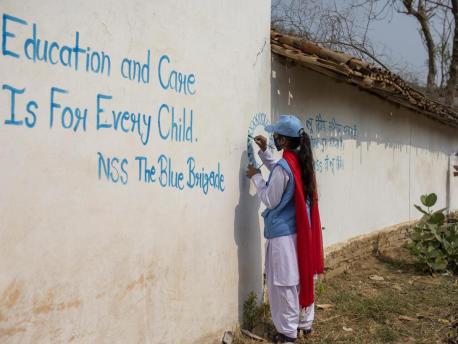
COVID-19 in India: Young People Get Creative to Protect Communities
Recognizing adolescents and young people who are helping to fight coronavirus in India.
Young people are battling coronavirus in India through heroic acts of goodwill and community support — helping their friends, families and communities.
These young champions have stepped up as researchers, advocates, innovators and communicators to promote health and safety throughout the pandemic. Their courage and relentless determination to help others as India battled a brutal second wave of COVID-19 remind us that it is within our power to create a healthier, safer and more equitable world.
Let us all recognize and support the teens and young people who continue to show remarkable adaptability and resilience in this challenging time.
Making lives better
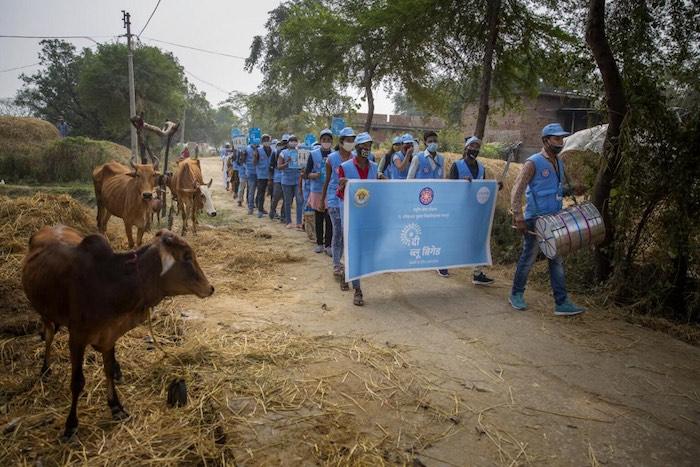
UNICEF and India’s national youth service program formed the Blue Brigade to support women and children adversely impacted by COVID-19. During the pandemic, young Blue Brigade volunteers, seen here in Chhattisgarh state's Baloda Bazar district, have sounded the alarm about growing threats to the most vulnerable children. © UNICEF/UN0387524/Altaf Ahmad
When UNICEF India and India's national public service program for young people launched the Blue Brigade, 25,000 young people signed up to advocate for child and maternal health. So far, they have reached 1 million people across the central state of Chhattisgarh, promoting essential immunizations for children under 5 and safe deliveries and antenatal care for all pregnant women at health facilities near their homes. The Blue Brigade also lobbies for children's right to education, safety and protection as schools remain closed due to COVID-19.
The power of youth and community radio
Since the COVID-19 pandemic began, Ashwathy Murali, a community radio producer from the tribal Paniyar community, has made it her job to overcome her listeners' COVID-19 vaccine hesitancy.
Ashwathy lives in Wayanad, a rural district in India's Kerala state, which is home to over 3,000 tribal hamlets, mostly belonging to the Paniyar community. When anxiety over COVID-19 vaccines swept through the region, Ashwathy Murali got government backing to create a program on the community radio station, Radio Mattoli, broadcast in the Paniya tribal dialect.
To raise awareness and build confidence in COVID-19 vaccine safety, Ashwathy tailored her broadcasts specifically for her Paniya listeners.
"I translated the discourses of expert doctors on COVID-19 vaccination and [prevention] into the Paniya language," she explains. "We also used jingles in Paniya based on the information provided by India's health department to create awareness via social media and radio.”
The result? Today her entire village is vaccinated.
Ensuring that no one is left behind
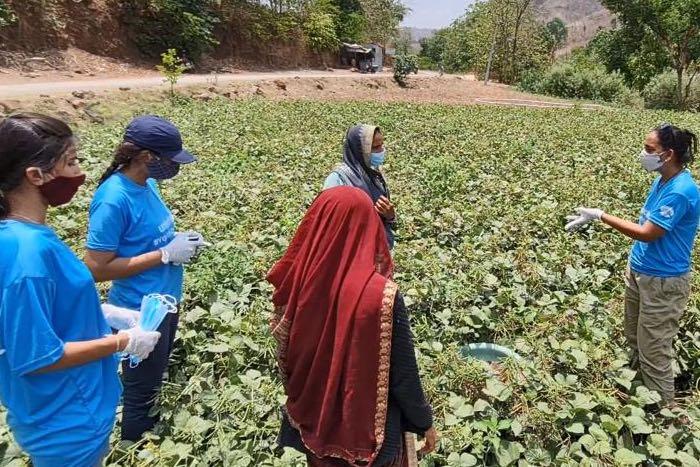
Thanks to youth volunteers, like those above who work in India's central Madhya Pradesh state, more residents in rural areas have decided to get vaccinated against COVID-19. © UNICEF India/2021
When misconceptions prejudiced people from tribal communities in Madhya Pradesh state against COVID-19 vaccines, Youth4Children volunteers Divisha Parwar, Ritesh and Aarti Yadav went door-to-door educating residents about vaccine safety and effectiveness.
Thanks to their efforts, more people are changing their minds and choosing to get vaccinated. They are also getting healthier.
In addition to addressing vaccine hesitancy, Divisha Parwar says that volunteers also “check people’s oxygen levels, distribute face masks and teach them proper handwashing techniques."
The ‘fake news’ fighter
Althaf is an advocate for children's rights from Chennai in Tamil Nadu state. Due to COVID-19, his father lost his job, and the family's household income plummeted. Despite these difficult financial circumstances, Althaf persevered, using his skills as a filmmaker to bust myths and misconceptions about COVID-19. To raise awareness and inform the public, he has created many videos and short films that share only verified information about COVID-19.
He has also taken his fight to social media, urging his followers to consult and share facts from trusted sources.
“There has been a lot of misinformation on COVID-19 spreading through social media channels," Althaf said in a recent public appeal that urged people to consult and propagate information from UNICEF India, the World Health Organization and India's government websites and social media channels. "Since I am following these channels, I share the same with the people in my community and tell them not to spread false information."
Library on wheels
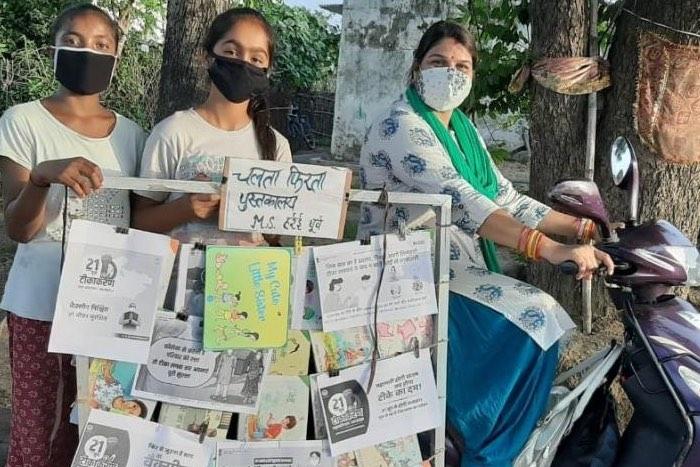
During India's school closures, student Mahima Singh (above with her teacher, Usha Dubey, and another student) has found helping children and young people continue to learn extremely gratifying: “We are doing our small bit to ensure my friends continue to study and in small ways reimagining our future.” © UNICEF India/2021
Schools may be closed, and children's learning disrupted. Still, nothing has stopped teacher Usha Dubey and her student, Mahima Singh, from hitting the road with their Library on Wheels to deliver books to kids in Madhya Pradesh's Singrauli district. Conceived to help children who don't have mobile phones or digital devices to access educational programming, the scooter library has kept children's love of learning — and Mahima Singh's hopes — alive during a difficult time.
"My conversations with my teacher and our journey are what I so look forward to," says Mahima Singh. "By doing our bit to ensure my friends continue to study, in a small way, we are also reimagining our future.”
Bridging the digital divide
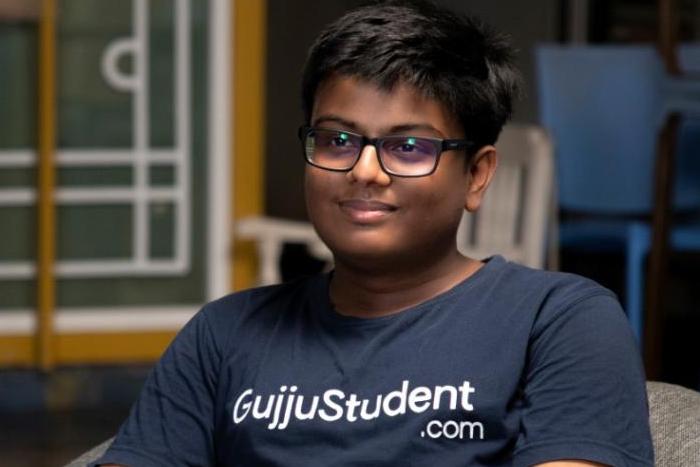
Hitarth Sheth, 17, (above) is a social impact entrepreneur from Surat, Gujarat, who developed the app Gujju Student, now used by thousands of students in Gujarat state. © UNICEF India/2021
Hitarth Sheth, 17, is a social impact entrepreneur from Surat in Gujarat state and founder of Gujju Student, an online learning platform that addresses some of the major roadblocks that Gujarati students face.
“The relative lack of online content in minority languages and the absence of content concerning large swathes of the world, especially low- and middle-income countries, is an issue I encountered as a student," says Hitarth Sheth. In finding solutions to some of the problems he encountered, Hitarth Sheth discovered that he could help others: "[My experience] led me to develop the app Gujju Student, which is now being used by thousands of students in Gujarat.”
Creating art to cope
Aditya is an artist from Patna, the capital of Bihar state. Though the lockdown in India during its second brutal wave of COVID-19 restricted his movement, it couldn't stop him from making art.
“During the lockdown, I had plenty of time to explore many things about myself, my hobbies and my dreams. Most of the time, I was designing and creating illustrations," a job Aditya says he dreams of pursuing once things get back to normal.
But when many of Aditya’s friends and family members tested positive for COVID-19, the young artist shifted his focus to be there for them, providing virtual comfort and valuable information from trusted sources. He also found ways to use art to do his part. He got involved in social campaigns for Bihar Youth for Child Rights, a youth-led organization working for children in Bihar state. Additionally, he created posters and videos for We Men With Women, a group that provides legal and psychological assistance to women facing sexual harassment and torture. "In March, we had a campaign and contributed to the good cause,” says Aditya with pride.
Using acts of kindness to change the world
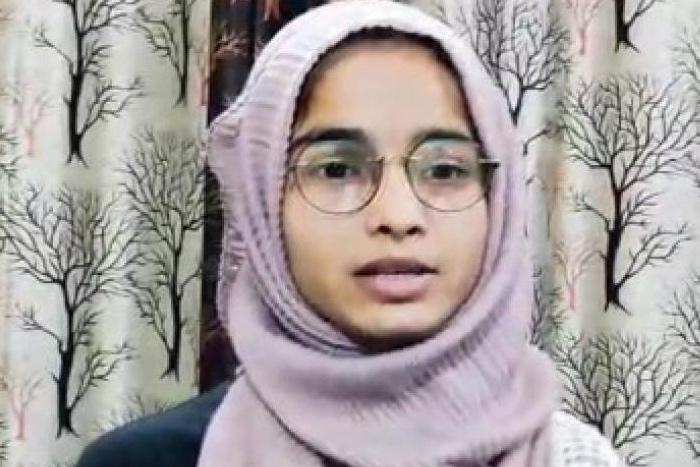
Mantasha (above) believes in the transformative power of kindness. “During COVID-19, I created and shared videos with authentic information to help people," she says. “We also collected and distributed provisions to families hit by the pandemic.” © UNICEF India/2021
Mantasha, an undergraduate pursuing a degree in elementary education, believes in giving back. She is an active volunteer who has been using her social channels to promote COVID-19 prevention measures for the past two years.
“I believe in building a selfless society through acts of kindness," says Mantasha, whose COVID-19 response has also included distributing books and school supplies to students who have found it hard to keep learning during the school closures. "I created and shared videos with authentic information to help people. We also collected and distributed provisions to families hit by the pandemic.”


